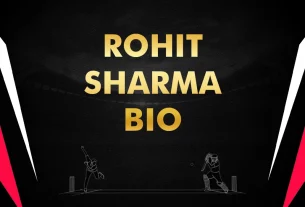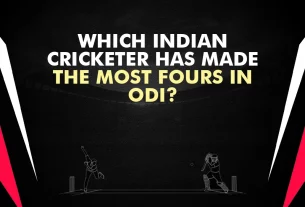Ricky Ponting Biography and Profile
Ricky Ponting is a Cricket legend. He is an Australian cricketer that is best known for his captaincy excellence. Ricky Ponting was born in Launceston, Tasmania, the eldest of Graeme and Lorraine Ponting’s three children, on 19 December 1974. His father had played cricket for clubs, his mother was a state vigoro champion, and he had an uncle, Greg Campbell, who played Test cricket for Australia. In June 2002, he married law student Rianna Cantor, with whom he has three children.
Outside of cricket, Ponting is a huge fan of Australian Rules football and supports the North Melbourne Kangaroos. In 2024, Ponting Wines partnered with the North Melbourne Football Club, showcasing his love for sports and fine wine.
Ricky Thomas Ponting is considered one of the greatest batsmen and successful captains in cricket history. Nicknamed “Punter”, Ponting made his Australian debut in both One-Day Internationals (ODIs) and Test matches in 1995, and enjoyed a very successful international career from that time, for almost 17 years. Ponting’s claimed 13,378 runs in Test matches, at an average of 51.85, including 41 centuries, and 13,704 runs in ODIs at 42.03, These performances are easily among the best in the history of Australian cricket. He would also claim 30 centuries in ODIs.
Ladies and gentlemen, as captain, Ricky Ponting led Australia through an unprecedented period of dominance, winning two ICC Cricket World Cups in a row (2003 and 2007), as captaining Australia to ICC Champions Trophy wins in (2006 and 2009). Ricky Ponting is the only player to have been part of 100 Test wins, and has the record of the most ODI wins, as a player, at 262.
To accompany his playing records, Punter was ICC Cricketer of the Year in 2006 and 2007, as well he was a Wisden Cricketer of the Year in 2006, and inducted into the ICC Hall of Fame in 2018. After retiring in 2012, Ricky transitioned into coaching and commentary, where he would be the coach of the Delhi Capitals for the IPL, and is, in 2025, still the head coach of the Punjab Kings and revitalising the turned franchise prospects.
Get knowledge like Ricky Ponting height in feet and other personal details in the following few sections:
Personal Details
- Full Name: Ricky Thomas Ponting
- Date of Birth: December 19, 1974
- Age: 50 years (as of 2025)
- Birthplace: Launceston, Tasmania, Australia
- Nationality: Australian
- Ricky Ponting Height in Feet: 5 feet 10 inches (1.78 meters)
- Batting Style: Right-handed
- Bowling Style: Right-arm medium
- Role: Top-order Batsman
- Nickname: Punter
Early Life and Family Background
Ricky Ponting was born into a family with deep sporting roots. His father, Graeme Ponting, was a good club-level cricketer, while his mother, Lorraine Ponting, was a state-v vigorous champion. Ponting’s uncle, Greg Campbell, played Test cricket for Australia from 1989 to 1990. Growing up in such an ambience, Ponting developed a natural inclination toward sports, particularly cricket.
Ponting attended Mowbray Primary School and Brooks High School in Launceston. His cricketing skills were evident at a young age, and he quickly moved through the junior cricket grades. By age 11, he was already playing club cricket against men—a sign of a true prodigy.
Domestic Career and Rise to Fame
Ricky Ponting and his domestic cricketing career have gotten off to an early start, displaying the dazzling talent of a prodigy and establishing an enviable international career. At just 17 years and 337 days old, Ponting made his first-class debut for Tasmania in November 1992, becoming the youngest player ever to represent the state in the Sheffield Shield. In that game against South Australia at the Adelaide Oval, he scored a respectable 56 runs, giving credence to his prospects.
Ponting’s breakthrough came during the 1994-95 Sheffield Shield season, in which he scored 965 runs at an impressive average of 48.25. This recognized performance included a double-century inning against Western Australia, thereby establishing his credibility for playing big innings. Such performances were a testament not only to his consistency but also to the strengthening of his reputation as among the most promising young batsmen in Australia.
Ponting’s early domestic success forced him on to the national scene to earn a spot with the Australian national team. It is indicative of his rare talent and determination that he was able to rise from the so-called gutter of domestic cricket and establish a bedrock for what would, of course, be a classical international career.
International Career
- Test Cricket:
He made his Test debut for Australia against Sri Lanka in Perth on December 8, 1995. He announced his arrival with a scintillating 96 runs in his first innings. In years, Ponting was a formidable force in the Australian batting line-up in Tests. He had played 168 Test matches and scored 13378 runs with an average of 51.85, with 41 centuries and 62 half-centuries added on. Ponting’s highest Test score was 257, against India in 2003.
- One Day Internationals (ODI):
Ricky Ponting made his ODI debut for Australia in 1995 against South Africa. Across his illustrious career, he played 375 ODIs, scoring 13704 runs with an average of 42.03. His aggressive stroke play and consistency were instrumental in establishing Australia’s dominance in world cricket around the late 1990s and early 2000s.
Ponting’s record in ODIs includes 30 hundred and 82 fifties, which showcase his calibre of performing the highest average. For the Northern Hemisphere, he deserves mention for leading Australia to victory in back-to-back World Cups in 2003 and 2007, thus making him one of the greatest leaders and a batsman to ever grace the game.
- Twenty20 International (T20):
Ricky Ponting, the first captain of the Australia Twenty20 International (T20I) team, led from 2005-09, participating in 17 matches, winning 7, and losing 10 for a 41.17%-win rate. As a batsman, he scored 401 runs in T20Is at an average of 28.64, indicating his accommodation to the game’s shortest format. Notably, Ponting captained Australia in the first-ever T20I match against New Zealand in 2005, a memorable event in the history of cricket.
Ricky Ponting – Captaincy and Achievements
Instrumental to Ponting’s success as captain was, perhaps, his ability to rally the players behind his vision for the team. Ponting has led Australia in 77 Test matches in his successful captaincy record, winning 48, losing 16, and drawing 15. Most matches won as a captain at the Test level; he captained in ODIs and led Australia in 230 ODIs-165 won, 51 lost, and two tied.
He captained Australia in successive World Cups, the ICC Cricket World Cup in 2003 and the 2007 World Cup, and won both tournaments without losing a single match. He is also the only player to have been part of 100 Test victories.
Cricketing Major Achievements & Records of Ricky Ponting
He is a phenomenal player, achieving all kinds of records and achievements in cricket. His career is rich and illustrious, and here are a few feathers of it:
Batted without Features:
- Test Cricket: 13,378 runs in 168 matches at an average of 51.85, with 41 centuries and 62 half-centuries.
- One Day Internationals: Scored 13,704 runs in 375 matches at an average of 42.03, including 30 centuries and 82 half-centuries.
Captaincy Honors:
- World Cup Wins: Australia won two ICC Cricket World Cups while captained by him: the 2003 and 2007 editions. Both times, his side went through the tournament unbeaten.
- Test Captains: Led Australia in 77 Test matches; captained for 48 victories, the highest for any Test captain.
Individual Awards:
- Wisden’s Leading Cricketer: Two recognised Wisden’s Leading Cricketers in the World in 2003.
- Allan Border Medal: Four-time recreation of the best Australian cricketer in 2004, 2006, 2007, and 2009
- ICC Awards: ICC Men’s Cricketer of the Year 2006, 2007; ICC Men’s Test Cricketer of 2006.
Impressive Records:
- Centuries Against All Test Nations: The first batsman to score centuries in ODI cricket against all Test-playing nations.
- Consistent: Third in the list of Test century-makers, after Sachin Tendulkar and Jacques Kallis.
With this, Ponting’s history attests to excellence of a very different nature within this game and an enduring impact.
Cricketing Style and Technique of Ricky Ponting
Ricky Ponting was among the most intimidating batsmen in cricket. His distinctive, merciless style will forever remain an integral part of the game. Study his technique to understand how he was effective against different kinds of bowling strategies and, of course, his reputation as a clutch performer.
- Yorkers in Death Overs
Ponting’s technique with yorkers, especially in last-over-death situations, showed his great skill and adaptability to the maximum. He could stand largely upright with extremely accurate reflexes to allow late swing and pace variety to be used efficiently. The fact he could bring his bat rapidly downward made it much tougher for bowlers to use successful yorkers against him. Thus, it would not be surprising if he had come forward for important runs even while the bowlers sought to contain his scoring by Yorker deliveries.
- Change of Pace
Complete aggression invigorated Ponting’s attitude, along with his adept handling of change of pace. He could tell quickly what bowlers were up to so that he had enough time to reset his timing. He generally finished strong with his bottom hand with slower balls to keep the scoring flowing and could not be put down by the slower deliveries. Such proficiency made it hard for the bowlers to contain him through pace variations.
- Unique Action
His batting style has always been marked by a unique approach to the traditional and aggressive at the same time. The minimal back lift was coupled with an even slightly open stance, which naturally brings in a wider range with shot-making. His pull and hook shots were among his marks, where players dispatch the short-pitched balls to the boundary effortlessly. This set him apart from many of his contemporaries through the unique blend of technique and aggression.
- Clutch Performer
There were innumerable instances when Ricky Ponting came out all guns blazing in match-winning performances under immense pressure from opposing teams. The innings of 140 not out on the grand stage of the 2003 Cricket World Cup final against India is a testimony to what the man is capable of on the grandest stages. Such performances established a firm foundation in establishing his reputation as a top player who could be relied on to seal the deal when the stakes were high.
Ricky Ponting’s style of batting combined technical stuff with an aggressive intention. His ability to counter yorkers, adjust well with pace variations, and deliver magnificent performances under pressure made him one of the most respected and successful batsmen in cricket history.
Fulfillment and Self-Discovery After Retirement of Ricky Ponting
Ricky Ponting took full advantage of his cricketing knowledge in various roles, such as becoming a coach after retirement from international cricket. From 2014 to 2016, he coached Mumbai Indians in the Indian Premier League (IPL), which crowned its performance in 2015. Between 2018 and 2024, he was the head coach of Delhi Daredevils/Capitals. In 2024, Ponting was appointed as head coach of Punjab Kings for the forthcoming IPL 2025 season.
Besides coaching, Ricky Ponting is now a recognized commentator who has made commentaries with bright analysis into the ears of fans and players alike. Other post-retirement activities include a venture to form Ponting Wines with award-winning winemaker Ben Riggs, which the cricketer believes should reflect an affinity for fine wine. This further shows Ponting as striving for excellence, on and off the field.
The cricket journey of Ricky Ponting portrays the meaning of excellence and resilience like no other. The talent that flourished early in Tasmania became Australia’s most successful Test captain. His aggressive batting and strategy made a huge mark on the game. After retiring from the game, Ponting was quick to get into coaching.
He coached famous teams like Mumbai Indians and Delhi Capitals in the Indian Premier League and shared his wisdom through commentary. He started Ponting Wines to excel beyond cricket. More than numbers, Ponting will be remembered as one who inspired a generation with his commitment, adaptability, and passion – all of which made him a legendary figure in cricket.
Also read: Babar Azam: Profile, Biography, Age, Records in 2025






